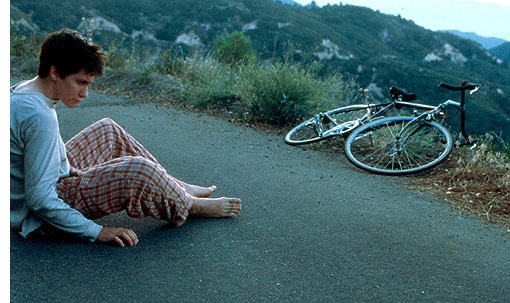For my second entry under the “Books” category, I will be reviewing a somewhat infamous sci-fi novel: “Farnham’s Freehold” by Robert A. Heinlein.

I actually don’t know if “infamous” is the right word, but suffice it to say that this particular novel has stirred up a bit of controversy over the years, at least among people who know who Robert A. Heinlein is.
I personally only became introduced to the man’s writing a few years ago, when I read perhaps his most famous novel, “Starship Troopers.”
I read “Starship Troopers” some years after first seeing Paul Verhoeven‘s film adaptation of it. And to be honest, the film didn’t impress me all that much, at least not the first time I saw it. But subsequent viewings, done on lazy afternoons out of boredom, made me find that I had been in error in dismissing the film so quickly. (I don’t care much for the sequels, by the way.)
A significant part of the story of that film (and the novel) has to do with a slightly modified conception of the word “citizen.” In the film (and the novel; the novel goes into more depth on this issue), one cannot be a “citizen” unless one is in the military. That isn’t to say that non-military people are subjugated, really: the main difference between a “citizen” and everyone else is that “citizens” are allowed to vote. Non-military people, people who aren’t “citizens,” can’t vote.
The novel explains that the rationale behind this is that if one has willingly joined the military – and “willingly” is important; no one is forced to join – one has put his or her own life at risk for the benefit of all humanity. Therefore one has shown that one’s decisions are not based upon selfish whims, but rather on what constitutes the greater good.
To be sure, in our world, this concept seems, to say the least, strange. But in the world of “Starship Troopers,” humanity is no longer divided into countries, at least not in the same way we are divided today. All of humanity is working together to fight off threats from other worlds.
And yes, this idea of “citizens” consisting entirely of military personnel is a little bit, well, “out there.” And I may delve into this issue at some point in the future here on my blog, but not today. I merely wanted to mention it to give an example of the sort of thing Heinlein speculated about.
Heinlein was known as one of the “Big Three” of “hard sci-fi,” along with Arthur C. Clarke and Isaac Asimov. Glance at the linked article for a better description of the term “hard sci-fi” if you are not familiar with the term, but it basically refers to sci-fi that is (at least mostly) based in actual science. To be sure, notions such as time travel and parallel universes and unproven things like that creep their way into “hard sci-fi” (including “Farnham’s Freehold”), but these things are always dealt with in such a way that reflects current scientific theories about these things.
I honestly don’t remember which of the other two of the Big Three said it – it was possibly both of them; for all the vast scientific knowledge and vivid imagination Clarke and Asimov possessed, they were refreshingly humble in their approach to writing, as was Heinlein – but at least one of them (Clarke or Asimov) referred to Heinlein as the true “master” of science fiction.
And though I have only read two of his novels, I have to say that if he isn’t a “master” of the genre, I don’t think there has ever been one.
In addition to keeping the “science” part of his sci-fi scientific, Heinlein also speculated quite compellingly about the effects his imagined advances in science would have upon society, and also how society itself might evolve over the millennia. And sometimes these speculations seem quite strange; nonetheless Heinlein presents them in such a way that they make complete sense, within the context of the stories themselves.
But enough blathering; on with the review:
“Farnham’s Freehold” begins in 1960s America, at the home of one Hugh Farnham. Hugh has an adult son named Duke, an adult daughter named Karen, an alcoholic wife named Grace, and an African-American “houseboy” named Joe. In addition, Karen’s friend from college, Barbara, is over for a visit.
You may have done a bit of a double-take at the word “houseboy.” And rightfully so. Joe, at the beginning of the novel, is essentially a live-in housekeeper.
And yes, the term “houseboy” may be construed as offensive. Joe is, after all, an adult.
But one must remember that this novel was first published in 1964. At that time, the Civil Rights Movement was going on. Back then, for a white family to have a black “houseboy” was not at all uncommon. Nor was it uncommon for a white family to treat their “houseboy” (and/or whatever the female equivalent of that distasteful term is) as if they were “beneath” them.
I am not saying that was “right.” Far from it. It was wrong, and it was shameful.
But it happened.
Hugh Farnham, the protagonist and patriarch in the story, is not a racist. He treats Joe – who is incidentally mentioned to be in accounting school – the way he treats everyone else. As an equal.
This is not the case for his wife Grace or his son Duke. These two are, to put it bluntly, bigots. They use racial epithets to describe Joe when he isn’t around. Hugh discourages them from doing so, which only makes them angry at him.
Which is typical bigot behavior.
And I think I have given a short peek at where the controversy lies in this novel. It has been called “racist” by many reviewers.
And I have to say, well, I disagree.
The notion that to illustrate racism in a text is to somehow make the text “racist” is…well, I suppose it’s a matter of opinion. In my opinion, if you want to discredit something like racism – as I posit Heinlein was at least attempting to do in this text – well, you have to illustrate what that something is. You have to show examples of it, I mean. And he does that quite well, I think.
But moving on with the plot, Hugh, Duke, Karen, and Barbara sit down to play contract bridge in the kitchen. Grace is passed out, and Joe has gone to bed. Suddenly, an emergency broadcast comes over the airwaves: the USA is under a nuclear assault.
Hugh is fully prepared for this eventuality. As a matter of fact, Duke has just been making fun of Hugh for building a nuclear bomb/fallout shelter under the house, one that is fully stocked with water, food, and supplies.
At any rate, when the emergency broadcast comes over the airwaves, everyone goes down to the shelter. Joe makes a last minute rescue of the family cat, then the shelter is sealed.
Not long after the shelter is sealed, Hugh declares that he is in charge, that he has made extensive plans for rationing food and supplies, and that anyone who has a problem with that can leave the shelter post-haste. Duke, in a somewhat typical “I’m a grown man, dad, you can’t tell me what to do” scene, tells Hugh he does not agree with this arrangement.
Hugh instructs Joe – the “houseboy” – to shoot Duke, if he refuses to comply. Joe, Hugh says, did not make fun of him when he (Hugh) was planning and building the shelter, Joe helped extensively with the construction and planning of the shelter, and Joe was now, for all intents and purposes, the second in command.
Of course, in later scenes – Duke submits to Hugh’s authority and Joe does not shoot him – Duke expresses resentment toward Joe, and his resentment often has an ugly bigoted tinge to it. As do other comments made about Joe.
But Hugh always steps up to Joe’s defense. Hugh does not treat Joe any differently – any worse or any better – than anyone else in his family. And he considers Joe to be part of his family.
At any rate, once everyone is in the shelter, the nukes hit. And they cause damage inside the shelter. It is assumed by everyone that the bombs hit pretty close to where the shelter is buried.
I don’t want to give too much away about the rest of the novel, at least spoiler-wise, but I have to give some things away, things that contributed to the controversy this novel generated.
But first, I would like to mention another sci-fi novel – although this other one crosses out of “hard sci-fi” and into “fantasy,” especially in its sequels – Frank Herbert‘s 1965 masterpiece “Dune.” If one glances at the pic provided at the top of this post, one can see my copy of “Dune” on the bookshelf behind me. I put it there on purpose.
At any rate, if you are familiar at all with the “Dune” series, you know that the government in “Dune” consists of a set of feudal lords, and that the mythology of the series borrows quite heavily from Islamic traditions, or at least Islamic nomenclature. “Houses” in “Dune” strongly resemble “Houses” in the Middle East, as do various customs and things like that in the novel and its sequels.
I do not know if Heinlein read any of “Dune” before he wrote and published “Farhnam’s Freehold” – parts of “Dune” had been serialized in late 1963 and early 1964, prior to its 1965 publication as a finished novel – but without revealing exactly how they got there, Hugh Farnham and his family end up in a “house” that also borrows quite heavily from Islamic traditions.
There is a supreme leader of the house, and a system of servants under him who cannot question his authority. The “law” is based on something similar to the Koran – which Hugh has read, being the amateur scholar that he is – the inhabitants speak “Language,” which is noted to be similar to Arabic, and there are many many slaves in the house, divided by sex. The term “harem rules” is mentioned several times. Men in the house are either “studs” or “tempered servants.” “Tempered,” as you can probably intuit without me explicitly saying so, means “neutered.” While this part may or may not have any root in any sort of Islamic custom, this next part certainly does:
The majority of women are known simply as “sluts,” or else “bedwarmers.”
This is where the main controversy surrounding the novel begins. And yes, yes, a thousand times yes, what I have written about is offensive. It’s horrible. It’s inhuman.
But is it impossible?
Has nothing like this ever happened before?
Does this sort of thing not happen today, in certain parts of the world?
(Are you familiar with the word “concubine”?)
But I suppose the main complaint about this novel is not that, believe it or not. And again, our Hugh does not approve of this situation. He finds it abhorrent. He has a “bedwarmer,” one who I believe is fourteen years old – yes, “ugh, ugh, ugh, ugh” – but he doesn’t do anything sexual with her.
And again, this is not the main point that is brought up against this novel, believe it or not. The main point brought up against it is that the people in charge – the “Chosen” – are all dark-skinned. The slaves are white.
The situation at the beginning of the novel – an upper-middle class white family with a black “houseboy” – is turned upon its head. At the end of the novel, the “houseboy,” by virtue of the color of his skin, is considered to be “Chosen,” and he gets all the privileges the other Chosen get.
Considering the disgusting misogynistic Islamic royalty-type setup of this situation, maybe it is racist, to a degree. Because for certain, other historical monarchies also once practiced sickening things like what happen in this weird future Islamofascist sci-fi scenario. Dark-skinned people are not the only ones who have perpetrated this sort of nonsense, historically speaking, and for it to be such a major plot issue…maybe it is a tad “racist.” But I don’t know; the setup of the house makes for some interesting plot points, points I will leave it up to you to find out about, should you choose to read the novel yourself.
But moving on, Hugh and Barbara – to remind, Barbara is Hugh’s daughter’s friend from college; for another spoiler, the six people at the beginning think they are the only people left in the world for a good part of the novel – become husband and wife at one point. And she gives birth to twins.
They – Hugh, Barbara, and their babies – make it out of the situation, eventually. Joe – who is the source of the “tit for tat” quoted in the title of this post – finds that he likes being the beneficiary of racial privilege. At first Hugh is shocked by this, but then realizes that he, too, despite his not being a bigot of any sort – or a misogynist, or any such thing – decides that he can’t really blame Joe for staying there.
Grace and Duke stay. They are, essentially, pets.
***
Reading back over this summary, I can see how this novel could be construed as wildly offensive, on a number of levels.
But I would like to remind everyone that it’s fiction. As in “not true.” As in “what if?”
At any rate, Hugh Farnham is not a bigot. Or a misogynist. And neither was Robert A. Heinlein – at least not from what I can tell of my limited reading of his work – and neither am I.
But all things considered, this novel was a good read. I enjoyed it, and I would recommend it to any fan of science fiction.
Thank you for reading my review of it.
***
And I have let about 36 hours go by, between when I wrote the above review and now. I reread my review of the novel in question, and I wasn’t sure I wanted to post that on my blog.
I am not a racist. I am not a misogynist.
And here I need to make a grammatical point:
“Racist” can be used as a noun, or as an adjective. I think you have to make “misogynist” into “misogynistic” for it to be an adjective, and what I am about to write applies to “misogynist/misogynistic” as well, but for simplicity’s sake, I am just going to focus on the word “racist.”
As a noun, “racist” means, basically, someone who adheres to the philosophy that one race is superior or inferior to another.
Example:
“Person A thinks that his skin color makes him superior to people of a different skin color. Person A is a racist.”
As an adjective, “racist” means, basically, expressing the philosophy that one race is superior or inferior to another.
Example:
Person A: “Everybody of my skin color is better than everybody of your skin color, Person B.”
Person B: “That’s racist, Person A. That statement you just made is racist.”
Many people like to make the argument that “people are racist, statements (and books, and any number of things) aren’t.”
And strictly speaking, that simply isn’t true. It is true that “Farnham’s Freehold” is not a racist. It is not a person who adheres to the philosophy that one race is superior or inferior to another race.
But, is it true that “Farnham’s Freehold” is a racist novel? Does this novel express the philosophy that one race is superior or inferior to another race?
I don’t really think so. I don’t personally perceive it as such. But does that mean that nobody in the world is entitled to disagree with me? Hardly.
I maintain that it was Heinlein’s intent to denounce racism with this novel. And from my point of view, I would say that he did a decent job of it.
But if you disagree, can I objectively say that you are wrong?
No, I cannot. Heinlein’s approach to racism in this novel was informed by his position in the society of 1960s America. He was a successful white dude*. And so was his protagonist, Hugh Farnham. As Joe (the African-American “houseboy”) mentions, Hugh never had the experience of riding a bus through Alabama as a “[n-word].”
And neither did Heinlein. Does Heinlein’s being a successful white dude mean he can’t be against racism? No! But, at the same time, he may or may not inadvertently have written things that could rightfully be described as “racist” by other people. Including other successful white dudes.
There are, indeed, racist statements made by white characters in the novel. And there are racist statements made by dark-skinned “Chosen” as well, in the imagined future where white people are their slaves. As I mentioned before, though, you can’t really denounce something like “racism” if you don’t show examples of it. And I would argue that’s what Heinlein was trying to do. Whether he succeeded is up to the reader.
I would argue that he succeeded. You may not agree.
At any rate, if you read this novel and are offended immensely by it, I would hope that your being offended would not cause you to label me as a “racist.” Or a “misogynist.”
I don’t consider myself to be either of those things, and I make a conscious effort not to express myself in such a way that may lead others to think I am one of those things.
But if I make a statement – or write a blog post – that makes you think I am a racist, or a misogynist, or any sort of thing like that that I do not consider myself to be, what matters more, objectively speaking:
My intentions behind my actions, which I consider to be anti-racist, anti-misogynist, anti-everything like that, or
Your perception of my actions?
My intentions matter more to me, of course, but don’t your perceptions matter more to you?
If I write something you construe to be racist, and you say “Hey, asshole, that’s racist,” does my saying “I didn’t mean to say something racist” mean that I didn’t say something racist?
No, it does not. Without intending to, in that situation, I would have made a racist statement. And I would have no right whatsoever to get angry at the person who perceived my statement as racist. The only rational course of action in that scenario, from my point of view, would be to say
“I am sorry I offended you. I didn’t mean to say anything racist, but now I know that what I said could be considered racist, so I will avoid saying that in the future.”
And if you are squirming in your seat, steam shooting out of your ears, with thoughts of “language police” and “political correctness gone mad” swirling through your brain, I am not requiring anyone else to follow my own personal approach to situations like this. I am merely telling you my approach. You are welcome to take it or leave it.
I follow that approach because it allows the lines of communication between me and that hypothetical person to remain open. I can continue to learn from that person through mutually respectful communication.
If I declare that they are crazy for calling me a racist (or whatever), I am cutting off the lines of communication.
And of course, if I don’t want to keep the lines of communication open between this hypothetical person and myself, I don’t have to. My perceptions of their behavior are as important to me as their perceptions of my behavior are to them.
Have I lost you? Have I circled back around to where I started, when I started writing this addendum to my review of a somewhat controversial sci-fi novel? Arguably.
But I would like to add one thing, then finish up:
My intentions, I would venture, are less important to you than your perception of me is to you. Am I incorrect?
I didn’t mean to come off as a racist or as a misogynist by giving this novel a positive review (despite all its abhorrent content), but if you feel I am a racist or a misogynist for doing so, how can I prove to you that my intentions were noble?
I can’t.
Thank you for reading.
*As an aside, please consider the inanity of this statement: “I think identity politics is a dumb concept.” Do you see what I mean? Every rationally thinking person in the world supports political ideas that support their own best interest, or at least what they perceive to be their own best interest. What they perceive as their own best interest is inexorably linked to their own personal identity. Therefore, everyone – yes, even you – is part of the phenomenon known as “identity politics.” You can point to special interest groups, which consist of people from this or that demographic, and scream “identity politics is the bane of society!” all you want, just be aware that when you do so, you are expressing your own “identity” in the political realm by doing so. So you may as well just keep that nonsense to yourself; there’s plenty of nonsense in the political realm already. (And yes, that last sentence is my own opinion, which hinges on my own “identity,” and so on and so forth.)











